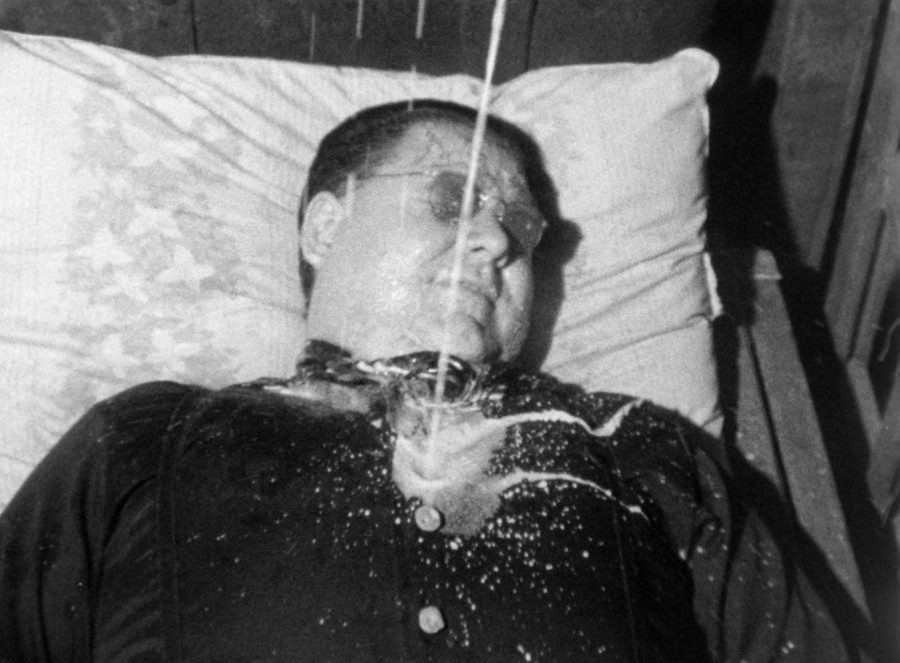Review: ‘Tales from the Gimli Hospital (4K Redux)’ revives the eccentric beginnings of a contemporary cinematic
“Tales from the Gimli Hospital (Redux)” wrangles myth against a meager budget to create an epic of emotional hysterics. The film, preceded by “The Heart of the World,” will play at the IFC Center on Oct. 14 and Oct. 15 at 8:10 pm followed by a Q&A with the director.
Stills: “Tales from the Gimli Hospital (4K Redux)” is Guy Maddin’s feature debut originally released in 1988. The Q&A for the film will take place at the IFC Center on Oct. 14 and 15 and it opens on Oct. 14. (Courtesy of Zeitgeist Films)
October 13, 2022
“Tales from the Gimli Hospital (4K Redux)” is Canadian filmmaker Guy Maddin’s first film, a 64-minute experiment caught between amateurish technical approaches and emotional effusiveness on behalf of its actors. In its remastered form, featuring the addendum “Redux” as part of its title, it’s clear that the film harbors a great deal of genius in spite of its crude design.
Set in a bygone Icelandic settlement in Gimli, Canada — which Maddin matches with his early-cinema-like aesthetic — the film concerns a sick and jealous man yearning for attention while stuck in a hospital gurney. This man, who is referred to as Einar the Lonely (Kyle McCulloch), cannot seem to invite any attention whatsoever from his nurses, no matter how loud he speaks or how much he gestures for care from his fixed position. At his side sits the affable Gunnar (Michael Gottli), a conversationally ebullient man-of-the-town who Einar blames for his loneliness, inspiring a rising tension that boils in a fabulous, and as expected of Maddin, fantastic fashion.
[Read more: Q&A: Celebrated Canadian filmmaker Guy Maddin talks myths and personality in filmmaking]
It’s a film about jealousy, monomania and the ridiculous degree to which men — yes, strictly, or perhaps canonically, men — share a tendency to reduce life to a series of competitions where they are always meant to triumph over an object, a person or a situation. It’s about men calling upon injustice out of thin air in order to avoid facing their own ill behavior, or their phallocentric vision of the world around them. As an artist who prides himself in therapeutic exhumation by way of films that address his worries through a melding of fact and fiction Guy Maddin demonstrates an early disposition to aim a spotlight on lamentable behavior. The hope is that such magnification will rid the damned mentality from himself and his viewers.
The set is placed in one location, the eponymous Gimli Hospital — a ramshackle abode that Maddin built by hand in his parent’s old beauty salon. The film intensifies the boiling jealousy Maddin fixes in Einar. By the time the hospital catches on fire as the film swerves into its climax, it seems as though the meager hospital could no longer sustain the emotional tension and reactively goes up in flames. This is the level of interplay Maddin often operates at, the idea that juiced-up emotional flares can radically alter the very framework of reality at a moment’s notice.
It must be said that for all the claustrophobic tension and limited locales featured in the film, such minimalism does produce a sedative effect on the viewer’s ability to imaginatively invest himself in Einar’s plight. It’s certainly Maddin’s meager budget that’s to blame, a fact that can be corroborated by the wild scale of his latest projects, but nonetheless, it’s sad to see so much artistic promise suppressed by such constraints.
“Tales from the Gimli Hospital (4K Redux)” is an amateur film. It’s amateur in its haughty production and technical imperfections, but it’s also amateur in its excitement, daringness and austere displays of originality. Although it may falter on the common scale by which films are often judged — whether they look good or not and whether the story chugs along neatly — Maddin’s film triumphs at the level of visual experimentation, emotional honesty and budgeted craftiness.
Contact Nicolas Pedrero-Setzer at [email protected].

























































































































































